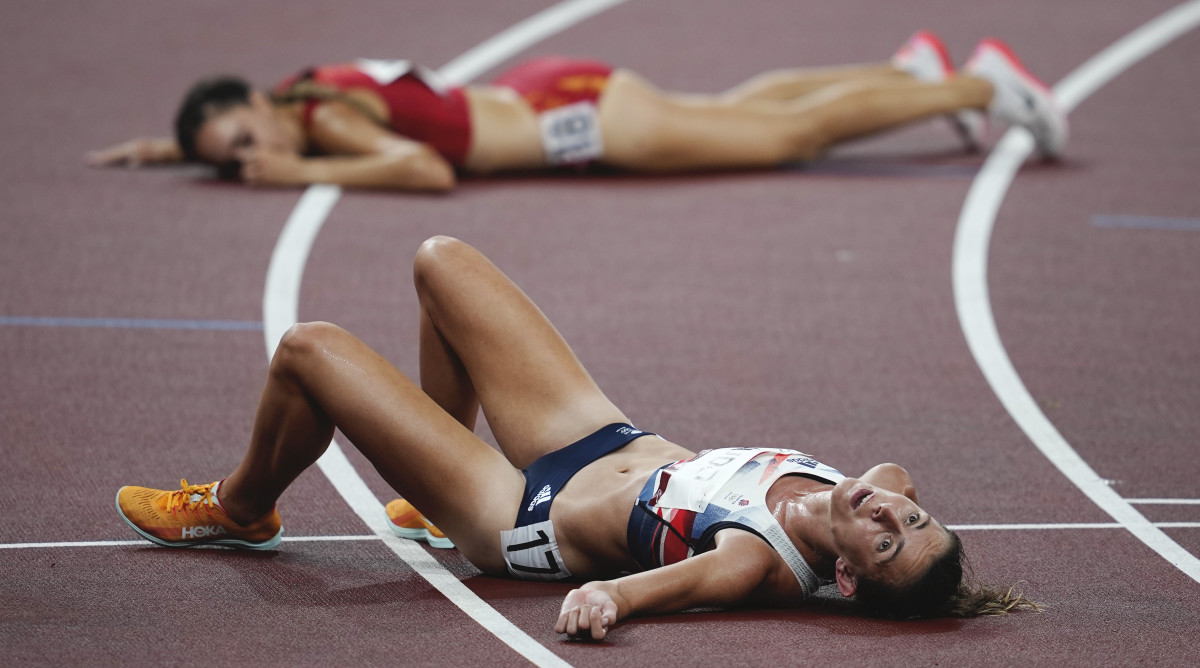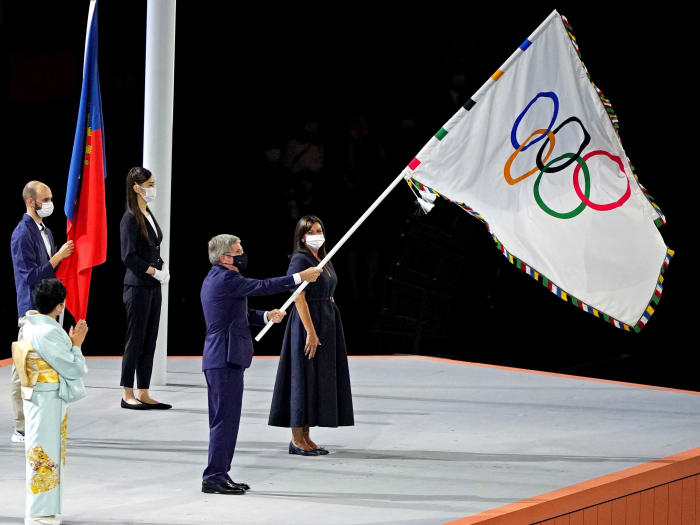
Olympic Athletes Should Stand Up to the IOC
TOKYO — There were many wonderful stories to emerge from these Olympics, and there was also this one: More than ever, athletes are taking care of themselves. But the International Olympic Committee isn’t really taking care of athletes.
While Simone Biles tried to recalibrate herself mentally, the IOC sent one athlete after another to compete in saunas. The heat index was 105 or higher here just about every day, creating conditions that seemed brutal to everyone except the IOC. Great Britain’s Jessica Judd collapsed after the 10,000-meter run. Russian tennis player Daniil Medvedev told the chair umpire, “I can finish the match, but I can die.” Then Spaniard Paula Badosa suffered heatstroke, defaulted, and left the court in a wheelchair—and only then did the IOC shift the start times, and only for tennis.
Golfers played in such oppressive heat that they had to focus as much on drinking water as hitting shots. Women’s soccer stars complained early in the tournament about the danger of holding a gold medal match in the middle of the day, but the IOC stuck to its plan until the night before. It also waited the day before the women’s marathon to move it from 7 a.m. to 6 a.m.
The IOC will treat the athlete as programming pawns for as long as the athletes take it. But what if they fight back?

Jessica Judd (GBR), front, and Lucia Rodriguez (ESP) lay on the track after the women's 5,000-meter preliminary heat at Tokyo's Olympic Stadium.
Andrew Nelles/USA Today Sports
The athletes always redeem the Olympics, and maybe someday they will realize it. We live in an age of athlete empowerment on all almost every level of sports. But in the past two weeks, Olympians dealt with a degree of mismanagement and organizational disregard that professional and even many amateur athletes would never tolerate. They can do better.
The IOC wants people to view the Olympics primarily as a competition between nations, much as the NCAA wants people to view its games purely as battles between universities. College athletes bristled at that con for decades. When they finally fought back, they earned rights that seemed unattainable a generation ago: not just the ability to capitalize on their name, image and likeness, but freedom to transfer where they choose without penalty. Meanwhile, the IOC holds Olympic events in scorching August weather, and it tells swimmers to compete in heats at night and finals in the morning even though they hate it, because it’s better for NBC—and everybody just figures the IOC can do what the IOC wants because the IOC always has.
There are no Olympics without the athletes. They hold more power here than they seem to realize.
Exercising that power will be tricky—much more challenging than, say, NBA or MLB players getting a game postponed to support social justice causes. There are many reasons why Olympic athletes would have a hard time advocating for themselves—so many that it might seem impossible. They have no union. There are more than 11,000 of them, from more than 200 countries. They have a two-week window every four years to compete in the Olympics. Many athletes live in countries with restrictive or autocratic governments, and even those who don’t risk the public’s wrath if they stand up for themselves. A lot of people mistakenly believe the Olympics are a patriotic obligation instead of a sporting event.
But look at it another way, and the math gets simpler. The IOC needs its broadcast partners. Those partners need stars. That means stars have power.
The evening before the women’s gold medal soccer match between Sweden and Canada, coaches for both teams said they had never considered boycotting the event. Whether they considered it or not, they should have. If Sweden and Canada had banded together and said they refused to play in 95-degree heat with 80% humidity, the IOC would have been forced to move the game earlier.
These are workplace safety issues. The way to address them is to put pressure on the people in charge.

IOC president Thomas Bach waves the Olympic flag during the closing ceremony at Tokyo's Olympic Stadium.
Kareem Elgazzar/USA TODAY Sports
Most athletes are understandably grateful just to have the chance to compete in the Olympics. They might not give much thought to how much money is involved and where it goes—and since they deal directly with their national organizing committees, not the IOC, there is a layer of bureaucracy between athletes and the ones running the event. The IOC is quite content to publicly applaud the athletes while quietly taking advantage of their gratitude, just as the IOC will be quite content to kowtow to authoritarian regimes for as long as it is lucrative.
COVID-19 has brought all sorts of societal reckonings, some of which were only tangentially connected to the pandemic. It’s not the IOC’s fault that the vast majority of athletes competed in empty venues with no family in the country, then had to depart quickly after competing. But the joyless nature of these Olympics, like the torturously slow pace of life in 2020, could make them stop and think—and then get angry.
These Olympics began with Naomi Osaka, who opted out of two Grand Slam events for mental health reasons, lighting the Olympic cauldron. Then the woman who was supposed to be the biggest star of the Games, Biles, had to pull out of most of her events. Tellingly, Biles and Osaka received almost universal support from their fellow athletes. They understand why Biles and Osaka looked out for themselves. When will they do the same?
More Olympics Coverage:
• Final Takeaways From Tokyo Olympics
• Handing Out Superlatives for the Tokyo Olympics
• Ariel Torres Wins the First-Ever U.S. Karate Medal
• Allyson Felix's Dignified Finish Sets Up a Promising Future
• Durant Cements Status As Best-Ever U.S. Olympic Men's Basketball Player




